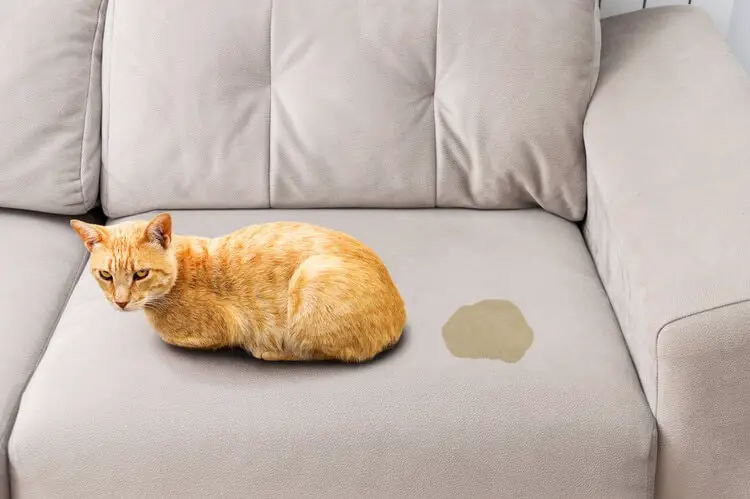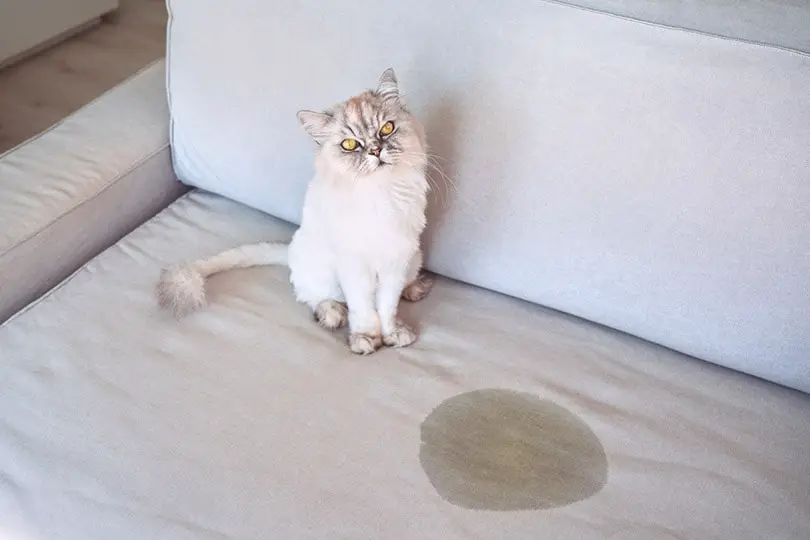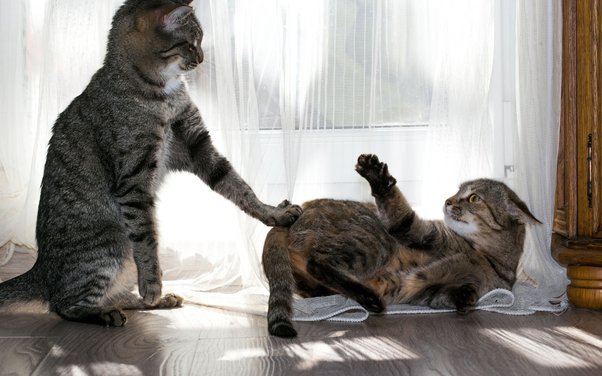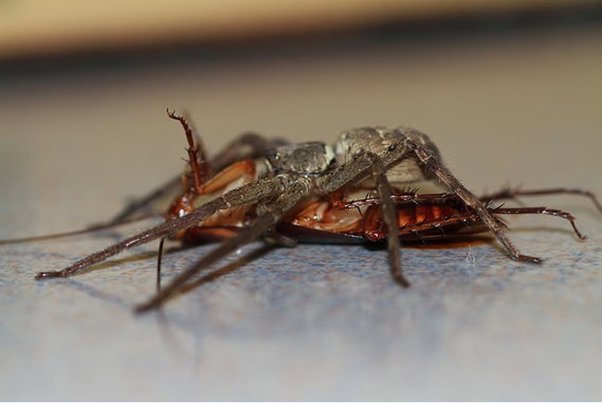Why Is My Cat Peeing On My Furniture?
Your cat may be peeing on your furniture due to territory marking or a medical issue. Now, let’s delve into why cats engage in this behavior and explore possible solutions to resolve the problem.
Cats are known for their cleanliness, so when they start urinating outside of the litter box, it can be both frustrating and concerning for their owners. One common reason is territory marking, as cats use urine to communicate their presence and establish boundaries.
It can also be a sign of a medical problem like a urinary tract infection or kidney disease. Other factors like stress, anxiety, or changes in the household can trigger this behavior as well. In order to address the issue, it’s important to understand the underlying cause and take appropriate measures to prevent further incidents of furniture soiling.
Why Is My Cat Peeing On My Furniture? Learn The Top Reasons Now!
Is your cat leaving an unpleasant surprise on your furniture? This behavior can be frustrating, but it’s important to understand the reasons behind it. In some cases, medical issues may be the culprit. Urinary tract infections, bladder stones, or diabetes can lead to inappropriate urination. If your cat is experiencing any of these conditions, it’s crucial to consult a veterinarian for proper diagnosis and treatment.
On the other hand, behavioral factors can also play a role. Cats may pee on furniture due to territorial marking, stress, or anxiety. Litter box aversion
can also be a cause, especially if the litter box is not cleaned regularly or if it’s placed in an undesirable location. Providing multiple litter boxes and ensuring they are clean and easily accessible can help prevent this behavior.Additionally, environmental stressors can influence a cat’s toileting habits. Changes in the household, such as moving, new pets, or renovations, can disrupt a cat’s routine and lead to furniture peeing. Creating a calm and secure environment for your feline friend, with plenty of enrichment and vertical spaces, can minimize stress and reduce inappropriate elimination.

Medical Causes Explored
Cats may pee on your furniture due to various medical causes. One common ailment is a urinary tract infection (UTI), which can cause discomfort and urge your cat to urinate outside of the litter box. UTIs can be detected through symptoms such as frequent peeing, blood in urine or strong-smelling urine.
Kidney stones and other health conditions can also lead to inappropriate urination. These conditions can obstruct urine flow, leading to accidents. Signs to look out for include pain while peeing, change in urine color, or your cat straining to urinate.
Diabetes and thyroid disorders may contribute to your cat’s urination issues. Diabetes causes increased thirst and urine production, while thyroid disorders can affect hormone levels and lead to bathroom accidents.
Feline idiopathic cystitis (FIC), a condition related to stress and inflammation of the urinary bladder, can be another cause. Cats with FIC may pee outside the litter box as a response to environmental changes or emotional stress.
Behavioral Reasons Analyzed
Understanding why your cat is peeing on your furniture can be frustrating, but there are several behavioral reasons that might explain this unwanted behavior. One common motive is marking territory. Cats have a natural instinct to mark their territory, and furniture can be a prime target.
Litter box preferences and dislikes can also play a role. Cats are picky creatures, and if they dislike their litter box, they may seek out other places to relieve themselves. It’s crucial to understand your cat’s preferences and ensure the litter box meets their needs.
Changes in household dynamics can also trigger inappropriate urination. Cats are sensitive to changes in their environment, such as the introduction of a new pet or a change in routine. These disruptions can cause stress and lead to urinary issues.
Lastly, inadequate training or past traumas could be contributing factors. If a cat hasn’t been properly trained to use a litter box or has had negative experiences associated with it, they may develop problematic elimination habits.
Environmental Factors Considered
There are several environmental factors that can contribute to a cat peeing on furniture. A stressful home atmosphere is one such factor. Cats are sensitive creatures and changes in their environment can cause them to feel anxious or threatened. Introducing new pets or family members can disrupt their routine and create stress. Likewise, reorganizing or moving furniture can alter their familiar territory and lead to anxiety. Shifts in the household routine, such as changes in feeding or playtime schedules, can also contribute to a stressful atmosphere for cats.
If your cat is exhibiting this behavior, it is important to identify and address the underlying cause. Creating a calm and secure environment for your cat may involve providing plenty of vertical spaces for them to escape to, setting up a quiet and comfortable litter box area, and using pheromone diffusers to help reduce anxiety. If the problem persists, it is advisable to consult with a veterinarian or animal behaviorist for further guidance.
Preventive Measures And Solutions
Maintaining the cleanliness and hygiene of the litter box is crucial in preventing your cat from peeing on furniture. Place the litter box in a quiet and accessible location, away from noisy appliances or heavily trafficked areas. Regularly clean the litter box, removing waste and replacing litter as necessary.
Vet Check-Ups: Regular veterinary check-ups are essential for staying ahead of any potential health issues that may cause your cat to urinate outside the litter box. Your veterinarian can identify and treat any underlying medical conditions that may be contributing to the behavior.
Stress Reduction: Creating a calming environment can help reduce your cat’s stress levels and minimize the likelihood of inappropriate urination. Provide your cat with plenty of hiding spaces, vertical scratching posts, and interactive toys. Establish a consistent routine and offer positive reinforcement for desired behaviors.
Behavior Modification Techniques: If your cat continues to urinate on furniture despite preventive measures, consult with a professional animal behaviorist. They can develop a tailored behavior modification plan, which may include counterconditioning, desensitization, and positive reinforcement techniques to address the issue.
When To Seek Professional Help
When dealing with persistent inappropriate urination issues with your cat, it may be necessary to seek professional help. Consulting with veterinarians who specialize in feline medicine is essential to rule out any underlying medical conditions that could be causing the problem. They can conduct necessary tests and provide medical solutions to address your cat’s urination issues.
If medical conditions have been ruled out, it may be beneficial to consult with behaviorists who are experienced in addressing advanced training needs. They can help identify any behavioral factors contributing to the inappropriate urination and provide guidance on modifying your cat’s behavior through training techniques and environmental modifications.
By seeking professional help, you can ensure that the underlying cause of your cat’s inappropriate urination is addressed and develop a comprehensive plan to resolve the issue. Remember, it’s important to be patient and consistent when implementing any treatment or training strategies.

Frequently Asked Questions On Why Is My Cat Peeing On My Furniture?
Why Is My Cat Peeing On The Couch All Of A Sudden?
Cats may pee on the couch suddenly due to several reasons, including stress, urinary tract infections, marking territory, or changes in their environment. It’s important to determine the underlying cause and consult a vet for proper diagnosis and solutions.
How Do I Stop My Cat From Peeing On Furniture?
To prevent your cat from peeing on furniture: 1. Clean the affected areas with an enzymatic cleaner. 2. Provide multiple litter boxes in different locations. 3. Ensure the litter box is clean and accessible. 4. Use deterrents like double-sided tape or aluminum foil on furniture.
5. Consult with a veterinarian to rule out any underlying medical issues.
What Smells Deter Cats From Peeing?
Certain smells can deter cats from peeing. Some effective options include citrus, vinegar, and lavender. These scents are disliked by cats and can help discourage them from urinating in unwanted areas.
Why Is My Cat Peeing On My Bed All Of A Sudden?
Cats may start peeing on your bed suddenly due to various reasons. It could be a medical issue like a urinary tract infection or behavioral problems like stress, anxiety, or marking territory. Observe any changes in their routine or environment and consult a vet for a proper diagnosis and solution.
Conclusion
To prevent your cat from peeing on your furniture, it’s crucial to understand the underlying reasons behind this behavior. By addressing potential medical issues and providing a conducive environment for your feline friend, you can effectively curb this problem. Remember, patience and consistency are key when tackling any behavioral issue.
Always consult with a veterinarian for professional advice tailored to your specific situation. Let’s create a harmonious space where both you and your kitty can live together happily.







